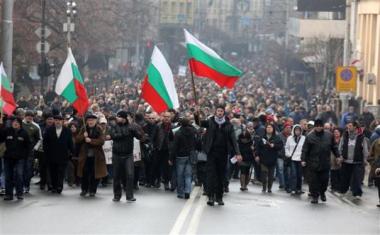
I was wondering, when I arrived here, ‘what is Bulgaria famous for?’ I couldn’t think of anything except for their umbrellas. And not even that. It’s not like they make umbrellas here, it’s just that one of the few times that the country received any attention in the international press was when dissident writer Georgi Markov was killed by the Bulgarian secret service in London in 1978. We saw a mediocre documentary on the subject in a Sofia art house the other day. Markov was one of Bulgaria’s most talented post-WWII playwrites. He gained a good measure of success in his home country in the 50s and 60s. But any true artist is by definition a free thinker, so he was bound to come into conflict with the communist leadership. His plays became ever more critical of the regime. They got cancelled, and finally Markov defected to the west. During the 1970s he worked for the BBC and for Radio Free Europe, writing scripts for the Bulgarian branch of the station. His transmissions were entitled ‘In Absentia Reports’, and they took on the dictatorship in the most devastating way, through ridicule. Totalitarian regimes can stand criticism in some occasions, but they cannot stand to be made fun of. Sarcasm exposes them for what they really are. For this reason, they say, the Bulgarian leadership decided to eliminate Markov. They were most probably aided by the KGB, which supplied the slow working poison. While Markov was waiting for the bus on a London bridge, he suddenly felt a sharp sting, he looked around and saw someone picking up an umbrella, then hurrying to jump into a cab. That same evening he was hospitalized with a high fever. Within a few days he died.
When communism collapsed over a decade later, all over the Eastern bloc the same thing happened. Communist party apparatchiks restyled themselves as democrats and looted national wealth in what was maybe one of the greatest robberies of all time. What used to be the Party, nominally working for the people, turned into a mafia of oligarchs with a fetish for money that dwarfed even the most greedy Wall Street bankers. For the people, it meant they lost the security of a job and the minimum sustenance needed to survive, and they acquired freedom. Freedom to speak their minds, freedom to emigrate overseas in search of fortune, freedom to starve on the streets.
The history of the shock transition still has to be written, because it is ongoing. But it’s clear that some countries have had less difficulties to adapt to mindless consumerism than others. Bulgaria has had a particularly hard time. Living standards are low, corruption is rampant, millions have left the country. Those who remain have little hope in themselves and their future. And yet, two months ago the people took to the streets and forced the government to resign. The reason was a sudden rise in electricity prices. In recent years, the electrical grid has been completely sold off to foreign companies. As local monopolies, they can demand any price they want, and so they do. The average income here is around 400 euros per month. A police officer told me that half of his income was absorbed by the electricity bill. That was last year. Then came a sudden ulterior increase in prices. In some places they doubled. No wonder that many riot police officers laid down their shields in solidarity when the people rose up.
The foreign press didn’t make serious mention of it – contrary to other famous occasions – but the situation is so desperate that five people have died by setting themselves on fire. The people demand the renationalisation of the electrical companies, an end to austerity measures, a serious fight against corruption and a general overhaul of the political system. But by resigning, prime minister Borisov (an ex-bodyguard of Bulgaria’s communist dictator Todor Zhivkov) has broken the momentum of the protest. There will be elections soon, but the Bulgarians’ faith in democracy is close to naught.
There are also people – natives – who say that the Bulgarians have only themselves to blame. It’s an idea that may be extended to every other oppressed people, the Greeks, the Spanish, the Portuguese. If you want change, it’s not enough to participate in a demonstration, to topple a government, or even to make revolution. Real change requires dedication, effort, strength, endurance. Every day, every week, every year. It requires self esteem, the conviction that you – as an individual and as a people – are actually capable of making a difference, and willing to do so, however long it takes, against all odds, even against all better judgment. Most people don’t have this strength. So they give up, they get screwed over, they lament themselves and they start to blame others.
In Bulgaria there doesn’t seem to be much hope at the moment. But in Spain, two years after the start of the Spanish Revolution, popular resistance is as strong as ever. There are demonstrations every week, and the coming spring the Spanish people will take their struggle to the next level. They will exercise the sovereignty that the constitution has vested in them, and they will exercise it directly. It’s going to be exciting. It’s going to be fun.
Oscar Ten Houten reports on European people's movements and uprisings on his Spanish Revolution blog.

